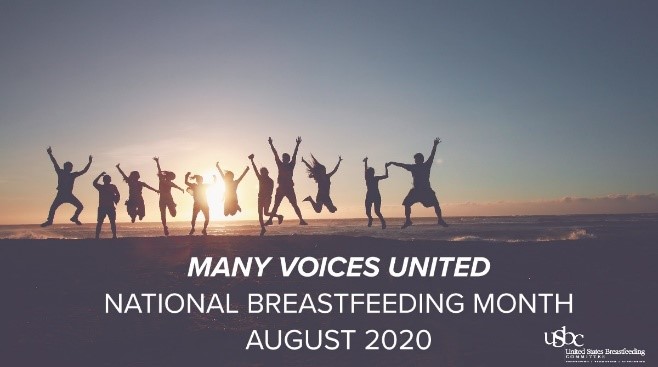August is National Breastfeeding Month
Monroe County, Fla. – National breastfeeding month is celebrated every year during the month of August. The theme this year is Many Voices United. With the persistent racial and ethnic disparities in our nation now at the forefront of the national news, this year’s national breastfeeding month is a perfect time to address the racial and ethnic disparities that also exist in breastfeeding.
The benefits of breastfeeding have been well-documented, and include economic, ecologic, psychologic, physiologic, and immunologic benefits. Low breastfeeding rates in some racial and ethnic groups have been linked to higher rates of illness and death (see fact list below). To change this outcome, we must come together as Many Voices United so that all mothers can receive the education and support needed to make an informed choice about how to best feed their infant, how to start breastfeeding when the baby is born, and how to continue breastfeeding if that mom has to return to work or school as so many moms in low-income families will have to do.
While 83 percent of the United States infants receive breast milk at birth, only 25 percent continue to provide only breastmilk for the first six months of life. This drop occurs because mothers may not receive adequate support they need when they have a problem, or they may think they should just stop breastfeeding when they have to go back to work or school, or perhaps they get shamed trying to breastfeed in public. This has to change now because it is further recommended by the World Health Organization that breastfed infants continue to be breastfed/provided breastmilk for two years and beyond! Help us support moms who choose to breastfeed.
Each National Breastfeeding Month has a specific focus:
Week 1 (August 1-7) is World Breastfeeding Week, Week 2 (August 9-15) is Native Breastfeeding Week, Week 3 is Young Child Feeding in Emergencies, and Week 4 (August 25-31) is Black Breastfeeding Week.
More information regarding each specific week can be found at www.usbreastfeeding.org.
In honor of the four highlighted weeks, please read and share the facts below:
- Breastmilk is a natural, renewable food that is environmentally safe and green because it is made and delivered to the consumer (baby) without pollution, packaging or
- Black infants are dying at twice the rate of white infants. According to the CDC, increased breastfeeding among black women could decrease infant mortality rate as much as 50
- There is no need to stop breastfeeding if you contract COVID-19. Transmission of active COVID-19 through breast milk and breastfeeding has not been detected to date. Antibodies and bio-active factors in breastmilk may fight against COVID-19 infection, if a baby is
- Almost 95 percent of infant and child deaths in emergencies result from contaminated water and an unsanitary environment during emergencies. This can be an issue when water is needed to make formula and formula has been linked to an increase in infant death and
- Breastfeeding releases hormones that lower stress and anxiety for both babies and
If a baby or mother becomes sick, the best thing the mother can do is continue breastfeeding to provide human antibodies that fight the illness.
- Based on limited data, American Indian/Alaska Native mothers have lower rates of breastfeeding initiation, duration, and exclusivity relative to other racial/ethnic groups except for African
- There is no regulation on how formula is advertised in the United States, a reason mothers could think formula is a comparable substitute for breast milk. It is not!
- Black infants have a higher rate of upper respiratory infections, type 2 diabetes, asthma, sudden infant death syndrome, and childhood obesity. Breastfeeding can help reduce the risk of these diseases. It is the best preventive medicine nature
- American Indian/Alaska Native rates of breastfeeding initiation is 73 percent, which is 10 percent lower than the
A 2016 study predicted higher rates of breastfeeding could improve our economy. Purely in terms of reduced healthcare costs due to improved breastfeeding practices, the study projected a total savings of more than $300 million in the United States, UK, Brazil and urban China alone. Other economic benefits of breastfeeding include higher IQs, greater school attainment and higher salary in later years.
Mothers are two and a half times more likely to breastfeed when breastfeeding is promoted and supported. In Monroe County, both the Healthy Start Program and the WIC Program actively promote and support breastfeeding by providing free assistance and information to all clients. WIC currently offers virtual education and support from breastfeeding peer counselors and a board- certified lactation consultant. (Due to COVID-19 both programs are offering services virtually, or by phone). This institution is an equal opportunity provider.
Call (305) 293-7500 for more information.
Lower Keys Medical Center also provides breastfeeding assistance for new moms: 305-294-5531 Ext. 4209.
[livemarket market_name="KONK Life LiveMarket" limit=3 category=“” show_signup=0 show_more=0]

No Comment